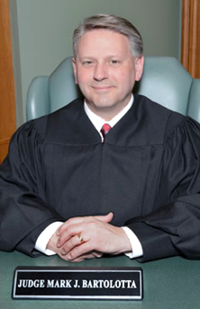Tech Grant ‘Truly Helped Court through Pandemic’

Operations for Lake County Probate Court and Judge Mark Bartolotta are more efficient thanks to upgrades funded by an Ohio Supreme Court Remote Technology Grant.

Operations for Lake County Probate Court and Judge Mark Bartolotta are more efficient thanks to upgrades funded by an Ohio Supreme Court Remote Technology Grant.
The public health challenges of the past year sparked a need for technological change to maintain Ohio’s courts. For many, funding from the Ohio Supreme Court allowed just that.
One such example is Lake County Probate Court.
With the $18,455 it received from the Supreme Court’s Remote Technology Grant, the probate court has drastically altered the way it conducts business amid the health and safety limitations required to prevent the spread of the coronavirus.
What was largely a face-to-face or in-person experience to address estates, wills, guardianships, and marriage matters, can now be done virtually.
“Receiving the grant from the Ohio Supreme Court expanded our ability to reach beyond the four walls of the courthouse in order to continue to provide our essential services to the people of Lake County,” said Judge Mark Bartolotta.
The addition of laptop and desktop computers, paired with accompanying software, has enabled video conferencing for hearings, staff meetings, and other business to be taken care of online.
The biggest benefit was alleviating a backlog of cases from the beginning of the pandemic before the tech upgrades and when on-site services were scaled back.
Since the implementation of the equipment, some recent advancements with virtual undertakings include civil commitment hearings, which involve people who are involuntarily admitted into mental health facilities. Those proceedings can now be cyber sessions from hospitals, since court personnel and the public are largely restricted from entering medical facilities due to COVID-19 concerns.
“This has been extremely beneficial in our office and has allowed us to continue operations at 100%,” said the court’s administrator Christine Gibaldi. “You never want to delay services, due process, or justice to any person participating in the judicial system.”
Remote-access technology has created continuity among all departments, whether staff are working from the court or their homes. It has allowed a rotating schedule among employees to limit the traffic within the probate court while maintaining full functionality in all of its departments.
The installation of an online portal that allows for marriage license applications, payments, and oaths to be scheduled and held electronically has created an unprecedented efficiency for the court.
Arguably, an even bigger joy for the court than couples getting married is children being adopted. Ceremonies initially halted by the pandemic have since been handled via videoconference with upwards of 40 people attending a virtual adoption.
Gibaldi is appreciative of all the ways the grant funds “truly helped the court through the pandemic,” but was particularly fond of continuing the adoption celebrations “and special days for these families that could not be taken away from them.”


